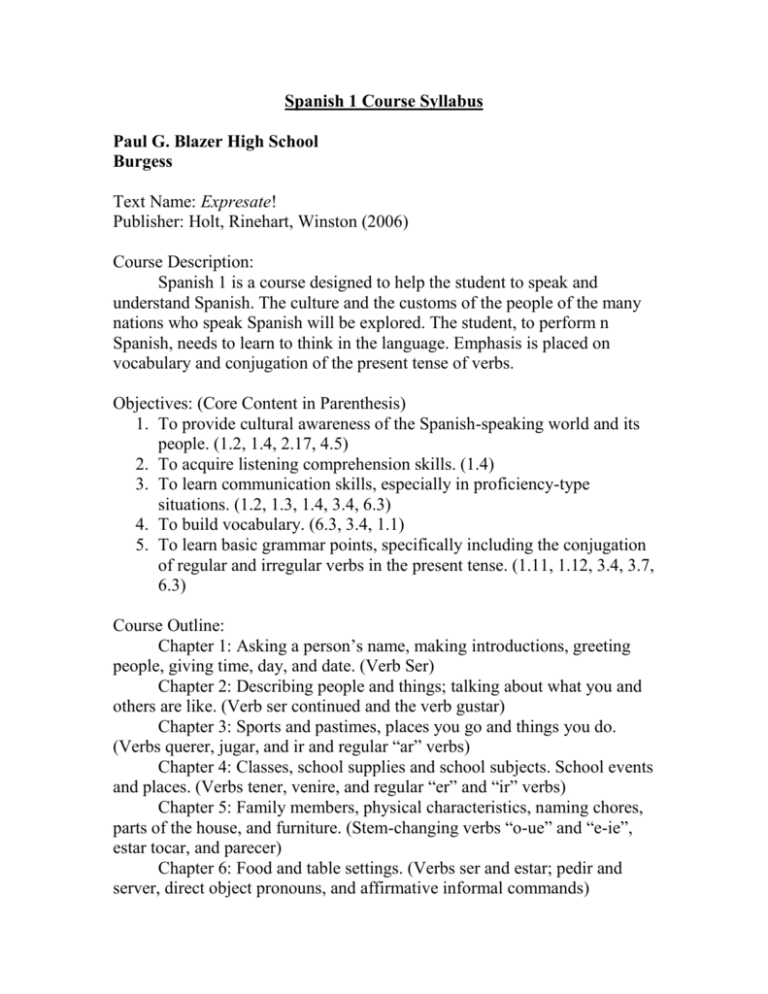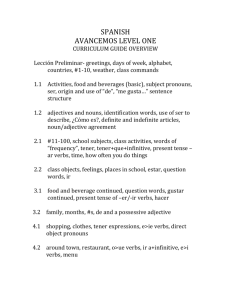Spanish 1 Course Syllabus - Ashland Independent Schools
advertisement

Spanish 1 Course Syllabus Paul G. Blazer High School Burgess Text Name: Expresate! Publisher: Holt, Rinehart, Winston (2006) Course Description: Spanish 1 is a course designed to help the student to speak and understand Spanish. The culture and the customs of the people of the many nations who speak Spanish will be explored. The student, to perform n Spanish, needs to learn to think in the language. Emphasis is placed on vocabulary and conjugation of the present tense of verbs. Objectives: (Core Content in Parenthesis) 1. To provide cultural awareness of the Spanish-speaking world and its people. (1.2, 1.4, 2.17, 4.5) 2. To acquire listening comprehension skills. (1.4) 3. To learn communication skills, especially in proficiency-type situations. (1.2, 1.3, 1.4, 3.4, 6.3) 4. To build vocabulary. (6.3, 3.4, 1.1) 5. To learn basic grammar points, specifically including the conjugation of regular and irregular verbs in the present tense. (1.11, 1.12, 3.4, 3.7, 6.3) Course Outline: Chapter 1: Asking a person’s name, making introductions, greeting people, giving time, day, and date. (Verb Ser) Chapter 2: Describing people and things; talking about what you and others are like. (Verb ser continued and the verb gustar) Chapter 3: Sports and pastimes, places you go and things you do. (Verbs querer, jugar, and ir and regular “ar” verbs) Chapter 4: Classes, school supplies and school subjects. School events and places. (Verbs tener, venire, and regular “er” and “ir” verbs) Chapter 5: Family members, physical characteristics, naming chores, parts of the house, and furniture. (Stem-changing verbs “o-ue” and “e-ie”, estar tocar, and parecer) Chapter 6: Food and table settings. (Verbs ser and estar; pedir and server, direct object pronouns, and affirmative informal commands) Chapter 7: Talking about one’s daily routine, naming body parts, talking about how one feels. (Reflexive verbs, estar, sentirse, tener, negative informal commands) Chapter 8: Clothing, stores, and things you buy. (Verbs costar and numbers to 1 million, preterite or “ar” and “ir” verbs) Chapter 9: Talking about plans, naming holidays, greetings and farewells. (Preterite tense of “er” and “ir” verbs, present progressive tense) Chapter 10: Asking for help, places in the airport, expressing hopes and wishes. (preterite of “car, gar, zar” verbs, hacer in preterite; commands of irregular verbs) Method of Evaluation: 1. 2. 3. 4. Chapter Tests Quizzes Homework Oral Presentations







